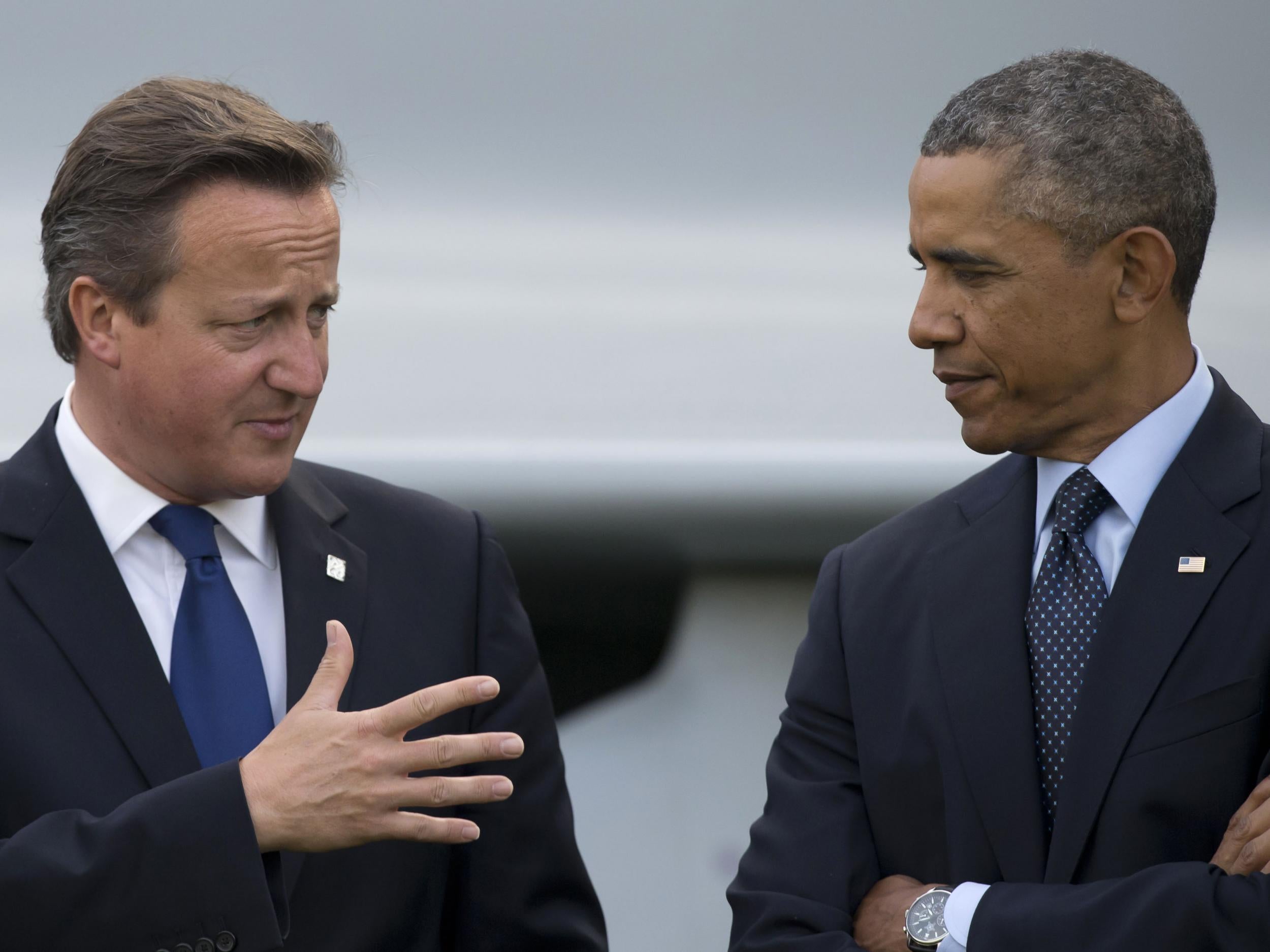US and UK play down tensions after Barack Obama 's*** show' comments
Mr Obama hit out at Britain and France for failing to stop Libya's decline after the toppling of Muammar Gaddafi

Your support helps us to tell the story
From reproductive rights to climate change to Big Tech, The Independent is on the ground when the story is developing. Whether it's investigating the financials of Elon Musk's pro-Trump PAC or producing our latest documentary, 'The A Word', which shines a light on the American women fighting for reproductive rights, we know how important it is to parse out the facts from the messaging.
At such a critical moment in US history, we need reporters on the ground. Your donation allows us to keep sending journalists to speak to both sides of the story.
The Independent is trusted by Americans across the entire political spectrum. And unlike many other quality news outlets, we choose not to lock Americans out of our reporting and analysis with paywalls. We believe quality journalism should be available to everyone, paid for by those who can afford it.
Your support makes all the difference.London and Washington have scrambled to soothe transatlantic tensions after President Barack Obama mounted an extraordinary public attack on David Cameron for his record over Libya.
Mr Obama took Downing Street by surprise when he hit out at Britain and France for failing to stop the north African state degenerating into a “s*** show” following the western military action which helped to topple Muammar Gaddafi from power.
He said part of the reason for the chaos in Libya – underlined by a United Nations report warning of major advances by Isis in the country – was that Mr Cameron had become “distracted by a range of other things”.
After Mr Obama’s undiplomatic language in an interview in The Atlantic magazine emerged, a spokesman for the US National Security Council said Mr Cameron had been “as close a partner as the President has had”.
He said: “We deeply value the UK’s contributions on our shared national security and foreign policy objectives, which reflect our special and essential relationship.”
Matthew Barzun, the American ambassador to Britain, insisted on Twitter: “Our relationship is essential. It is special. True yesterday, true today and will be true tomorrow.
“We’ve long worked together for a more peaceful, prosperous and just world. Look at Nato, Iran deal, counter-terrorism, Ebola, trade and aid.”
David Cameron’s spokeswoman welcomed the White House’s olive branch and maintained that the Prime Minister did not regret any of his actions over Libya. She said: “We’ve done all we can and we think it’s been the right approach.”
Andrew Mitchell, who was the International Development Secretary at the time of the Libya intervention in 2011, said it was “extremely unfair and completely untrue” to suggest Mr Cameron had lost focus on Libya.
Mr Mitchell said: “[Mr Obama] certainly doesn’t appreciate the full extent of the plans made for stabilising the situation in Libya when the immediate conflict stopped.
“The problem was, of course, that there was no peace to stabilise. That’s why Libya has proved to be so challenging.”
But John Baron, the only Conservative MP to vote against British involvement in Libya, said: “President Obama is right that Libya is a shambles.
“We did not understand the complexities of the situation, or how events would play out post-conflict. This lack of knowledge has once again caused a worse situation, including the presence of extremists such as [Isis] as well as an immigration crisis.”
In a report to the UN Security Council, the team monitoring arms sanctions against Libya warned that Isis had recruited marginalised groups in the central city of Sirte, which it controls, and boosted its strength in the capital, Tripoli, as well as in the city of Sabratha.
The six-member panel said: “While [Isis] does not generate direct revenue from the exploitation of oil in Libya, its attacks against oil installations seriously compromise the country’s economic stability.
“Libyans have increasingly fallen victim to the terrorist group’s brutalities, culminating in several mass killings.”
Mr Obama said the Libya intervention had “averted large-scale civilian casualties” and almost certainly prevented “a prolonged and bloody civil conflict”.
But he added: “Despite all that, Libya is a mess.” According to the magazine, the President privately used the phrase “s*** show” to describe the turmoil in the state.
Sir Malcolm Rifkind, the former Foreign Secretary, said it was “a bit rich” for the President to single out Britain and France for blame as they had carried out more air operations over Libya than any other country.
Join our commenting forum
Join thought-provoking conversations, follow other Independent readers and see their replies
Comments